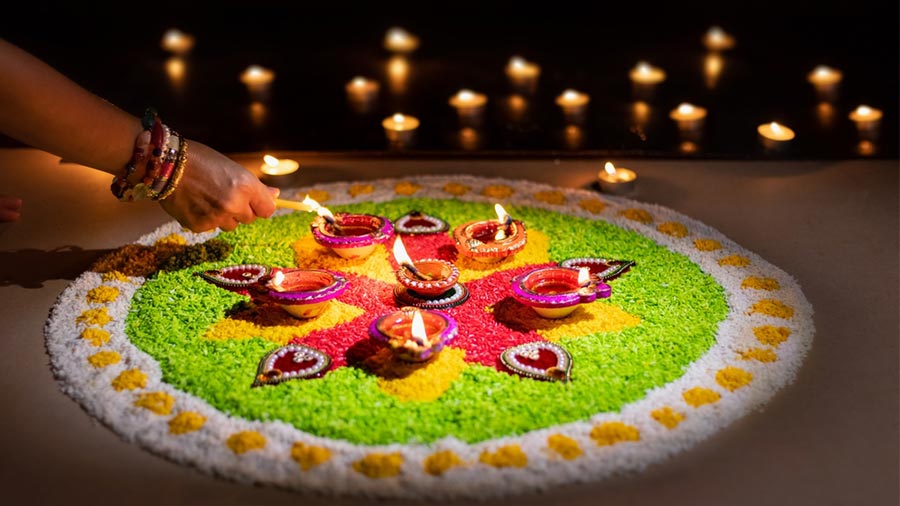The season of festivals has already begun and now the time of Deepawali has come around again. Among all Hindu festivals, Diwali or Deepawali, the festival of lights, is undoubtedly the biggest and the brightest.
This festival is celebrated with great joy and enthusiasm not only in India but also in countries like Nepal, Sri Lanka, Thailand, Malaysia, Indonesia, Singapore, Fiji, Mauritius, Trinidad and England, and is part of different cultures and religions.
We can think of Deepawali as being made of two words: deep (light) and avali (a row), which means a row of lights. As we all know, the festival is celebrated by lighting lamps in temples, homes, stores, sidewalks and dark places.
And of course let us not forget the accompanying lightand-sound show that has become so integral a part of the celebrations.
Deepawali is celebrated in the sandhi (fusion) period of the months of Ashwina and Kartikain (October-November) all over India. It is thought by many that the celebration originated from the sacrifices of the Vedic Aryans. There are many legends related to this celebration.
One of them is that it commemorates the return of Rama to Ayodhya after his 14-year exile and killing of Ravana, which signifies the triumph of good over evil, of light over darkness.
In western India, it welcomes both Goddess Lakshmi, the goddess of wealth and prosperity, and Lord Ganesha, who blesses business and undertakings with success. In the south, Deepawali celebrates the victory of Lord Vishnu over Bali. Also, it is the victory of Rukmini, wife of Lord Krishna, over Narakasura, signifying the triumph of women’s power.
In Bengal, Kali is worshipped on the day of Deepawali, and the night is known as Mahanisha, or great night, which is the overcoming of darkness and fear of death by her. For some it is a commemoration of the beginning of the reign of King Vikramaditya.
Many Buddhists celebrate the change of heart of King Ashoka from himsa to ahimsa, thus following the path of peace and wisdom. In Christian homes, diyas are lit, symbolising evil being overcome by God, who is Light, and also to usher in goodness, peace, prosperity and God’s blessings.
In Goa, it is a custom for people to cook various types of rice flakes to distribute during this festival.
Deepawali celebrates the victory of light and wisdom over darkness and ignorance and it is a rejoicing in God’s victory over evil.
The inner significance is that ultimately light will overcome darkness. This belief and affirmation are present not only in Indian traditions but also other religious traditions, including Christianity.
It symbolises the illuminating presence of God in us and the awakening of an inner consciousness to the harsh realities of the darkness of selfishness, oppression, injustice, corruption, division and other evils.
We need to overcome such darkness with the Light of God, and we should work to establish love, joy, peace and harmony, among all, and so incorporate in ourselves and become the light of God.
In Deepawali, light is also the symbol of wisdom. Wisdom is most essential for us to be genuinely happy. Wisdom is the breath of conscience. It tempers desire.
It keeps us from evil and temptation.
There is a story in theBible about how God wanted to give King Solomon wealth and every other possible thing.
But Solomon prayed to God for wisdom so that he could tell good from evil and could love and serve people in the way God wanted.
Wisdom gives us the awareness of the real value of things for our life here and for our life beyond. This Deepawali, let our prayer be this: “We entreat You, our Light, our Wisdom, to bless us and dispel the darkness of our body, mind, heart and soul. Free us from all bondage and make us your light, your wisdom to serve you in all our brothers and sisters always and everywhere by bringing your joy and love, your light and wisdom to all around us.”
